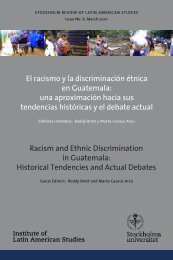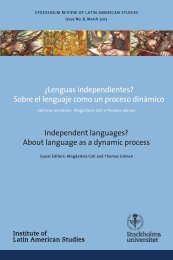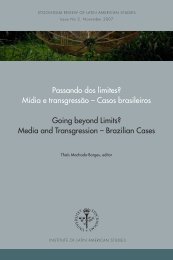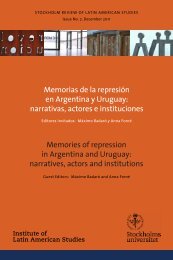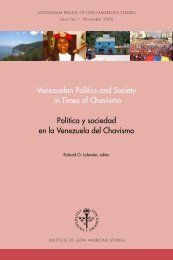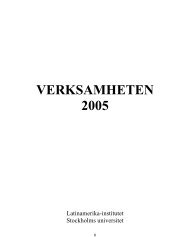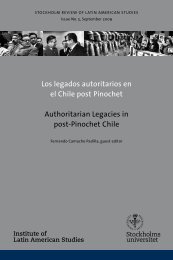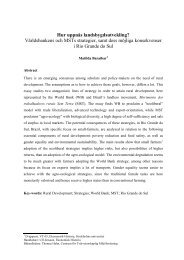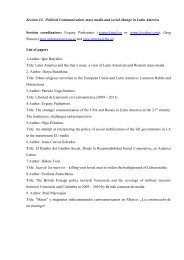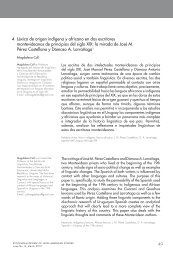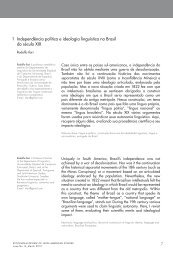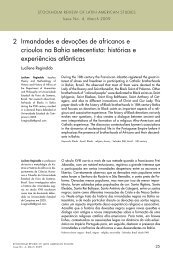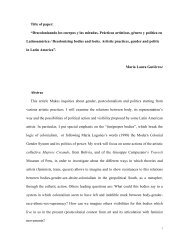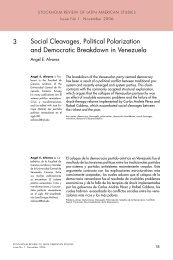Papers - Conference 2009 - Institute of Latin American Studies
Papers - Conference 2009 - Institute of Latin American Studies
Papers - Conference 2009 - Institute of Latin American Studies
Create successful ePaper yourself
Turn your PDF publications into a flip-book with our unique Google optimized e-Paper software.
een to stand up to neo-liberalism and to work for a development <strong>of</strong> an alternative (Borras Jr.2008: 260).Due to global risks such as global warming, environmental degradation, terrorism,pandemics, poverty, mass migration, etcetera – all <strong>of</strong> which are related to the consumptiondriven neo-liberal economic model – the future <strong>of</strong> the world is highly uncertain. What seemsto be <strong>of</strong> a more certain nature, however, is that “[…] old truisms and well-worn practices”have proved not to be working very well (Smith 2004: 221); at least not if global sustainabledevelopment is what is aimed for. 8 Thus, what MST, La Via Campesina, and many other civilsociety actors around the world are stressing is the urge for an alternative world (Curran 2007;Klein 2001; Becker 2007; Seone & Taddei 2002; Petras 2002; Santos 2008; Stedile 2004).However diverse these movements, and other actors, may be, and whether this diversity is tobe considered beneficial or not, a belief in the possibility <strong>of</strong> another world, and a consensusplacing corporate-led neoliberal globalization as the main target for resistance seem to bestrong and important unifying factors.In the year <strong>of</strong> 2001, as a response and alternative to the “World Economic Forum” 9(WEF), social movements and other social actors met for the first time in the Brazilian city <strong>of</strong>Porto Alegre in what has become known as the “World Social Forum” (WSF). One <strong>of</strong> theorganizers in the forefront for this event was MST (Plummer & Ranum 2002: 21). The WSFhas since then become “[…] the world‟s largest meeting <strong>of</strong> civil society” (Becker 2007: 203)and the “[…] most consistent manifestation <strong>of</strong> counter-hegemonic globalization” (Santos:2008). Central to the forum is to “[…] rethink globalization”, and to put “[…] human rights,social justice, and ecological sustainability before pr<strong>of</strong>its” (Ibid.207). 10 Another central aspect<strong>of</strong> the WSF is that there is no specific underlying political ideology <strong>of</strong> how to construct analternative world or <strong>of</strong> how such world is suppose to be. This opens up for a broad range <strong>of</strong>participants that may have different ideas <strong>of</strong> how to restrain and/or transform globalization aswell as what issues that should be in focus (Curran 2007: 9). In other words, the WSF seemsto be an inclusive event both when it comes to scale and thematics (Santos 2008: 250). As8 “Sustainable development” is a somewhat diffuse concept with various definitions. The definition I havechosen to follow in this paper is the one put forward by the World Commission on Environment andDevelopment: ”Sustainable development is development that meets the needs <strong>of</strong> the present withoutcompromising the ability <strong>of</strong> future generations to meet their own needs”. (WCED 1987). For further elaborationon this definition, see WCED 1987. See also Chasek 2008 and Reeves & D‟Costa 2008.9 This is a meeting, held in the Swizz city <strong>of</strong> Davos once a year, in which corporate and governmental elites <strong>of</strong>the world gathers to discuss the forthcoming <strong>of</strong> economic globalization (Becker 2007: 203). See alsoWeforum.org.10 See also WSF 2002.6



